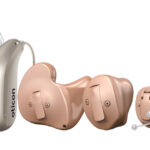Is your dog or cat going deaf? Well, it is certainly possible.
If you look at the hearing and balance system of dogs and cats (in fact, all mammals) they are very similar to that of humans. So, it is reasonable to assume that many of the conditions that affect our hearing are just as likely to affect your dog or cat.
If we consider the most common causes of hearing loss, which are age related, noise exposure and disease, we can see that all mammals are susceptible to these things. We know that gun dogs develop hearing loss as a result of noise exposure and our dogs and cats are just as susceptible to the effects of age-related hearing loss as we are.

In domestic animals, there is an additional factor that needs to be considered. Due to selective breeding, genetic anomalies tend to get amplified over generations and this has led to some specific breeds of cats and dogs having a significantly increased risk of hearing loss.
The best known example of this is in dogs, where some studies have shown that about 20 per cent of Dalmatians have significant hearing loss in one ear and about eight per cent have hearing loss in both ears. So far as cats are concerned, it is well known that blue eyed white cats have a strong likelihood of having hearing loss due to a genetic abnormality.
By the same reasoning, it is also fair to assume that dogs and cats can develop tinnitus and we know that some animals develop balance disorders and again, this sometimes has a genetic basis.
Unfortunately, fitting a cat or a dog with a hearing aid is not a serious option, although it has been tried. The animals will not tolerate the physical sensation of having the ear blocked. So, we are not planning to offer a hearing aid service to your cat or dog anytime soon.

